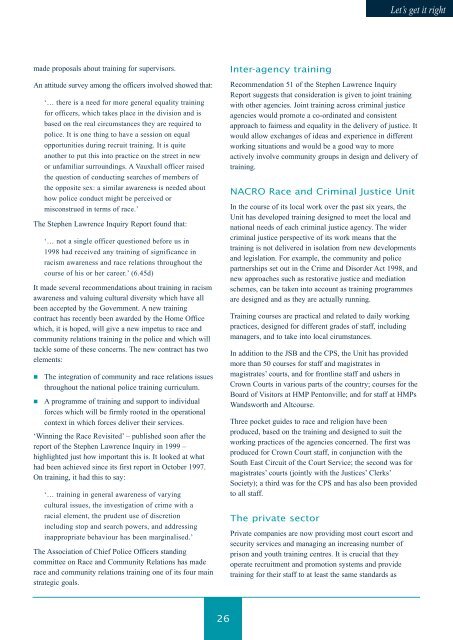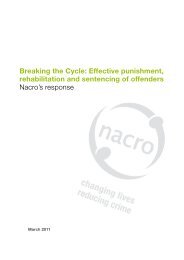Let's get it right: race and justice 2000 - Nacro
Let's get it right: race and justice 2000 - Nacro
Let's get it right: race and justice 2000 - Nacro
- No tags were found...
Create successful ePaper yourself
Turn your PDF publications into a flip-book with our unique Google optimized e-Paper software.
Let’s <strong>get</strong> <strong>it</strong> <strong>right</strong>made proposals about training for supervisors.An att<strong>it</strong>ude survey among the officers involved showed that:‘… there is a need for more general equal<strong>it</strong>y trainingfor officers, which takes place in the division <strong>and</strong> isbased on the real circumstances they are required topolice. It is one thing to have a session on equalopportun<strong>it</strong>ies during recru<strong>it</strong> training. It is qu<strong>it</strong>eanother to put this into practice on the street in newor unfamiliar surroundings. A Vauxhall officer raisedthe question of conducting searches of members ofthe oppos<strong>it</strong>e sex: a similar awareness is needed abouthow police conduct might be perceived ormisconstrued in terms of <strong>race</strong>.’The Stephen Lawrence Inquiry Report found that:‘… not a single officer questioned before us in1998 had received any training of significance inracism awareness <strong>and</strong> <strong>race</strong> relations throughout thecourse of his or her career.’ (6.45d)It made several recommendations about training in racismawareness <strong>and</strong> valuing cultural divers<strong>it</strong>y which have allbeen accepted by the Government. A new trainingcontract has recently been awarded by the Home Officewhich, <strong>it</strong> is hoped, will give a new impetus to <strong>race</strong> <strong>and</strong>commun<strong>it</strong>y relations training in the police <strong>and</strong> which willtackle some of these concerns. The new contract has twoelements:The integration of commun<strong>it</strong>y <strong>and</strong> <strong>race</strong> relations issuesthroughout the national police training curriculum.A programme of training <strong>and</strong> support to individualforces which will be firmly rooted in the operationalcontext in which forces deliver their services.‘Winning the Race Revis<strong>it</strong>ed’ – published soon after thereport of the Stephen Lawrence Inquiry in 1999 –highlighted just how important this is. It looked at whathad been achieved since <strong>it</strong>s first report in October 1997.On training, <strong>it</strong> had this to say:‘… training in general awareness of varyingcultural issues, the investigation of crime w<strong>it</strong>h aracial element, the prudent use of discretionincluding stop <strong>and</strong> search powers, <strong>and</strong> addressinginappropriate behaviour has been marginalised.’The Association of Chief Police Officers st<strong>and</strong>ingcomm<strong>it</strong>tee on Race <strong>and</strong> Commun<strong>it</strong>y Relations has made<strong>race</strong> <strong>and</strong> commun<strong>it</strong>y relations training one of <strong>it</strong>s four mainstrategic goals.Inter-agency trainingRecommendation 51 of the Stephen Lawrence InquiryReport suggests that consideration is given to joint trainingw<strong>it</strong>h other agencies. Joint training across criminal <strong>justice</strong>agencies would promote a co-ordinated <strong>and</strong> consistentapproach to fairness <strong>and</strong> equal<strong>it</strong>y in the delivery of <strong>justice</strong>. Itwould allow exchanges of ideas <strong>and</strong> experience in differentworking s<strong>it</strong>uations <strong>and</strong> would be a good way to moreactively involve commun<strong>it</strong>y groups in design <strong>and</strong> delivery oftraining.NACRO Race <strong>and</strong> Criminal Justice Un<strong>it</strong>In the course of <strong>it</strong>s local work over the past six years, theUn<strong>it</strong> has developed training designed to meet the local <strong>and</strong>national needs of each criminal <strong>justice</strong> agency. The widercriminal <strong>justice</strong> perspective of <strong>it</strong>s work means that thetraining is not delivered in isolation from new developments<strong>and</strong> legislation. For example, the commun<strong>it</strong>y <strong>and</strong> policepartnerships set out in the Crime <strong>and</strong> Disorder Act 1998, <strong>and</strong>new approaches such as restorative <strong>justice</strong> <strong>and</strong> mediationschemes, can be taken into account as training programmesare designed <strong>and</strong> as they are actually running.Training courses are practical <strong>and</strong> related to daily workingpractices, designed for different grades of staff, includingmanagers, <strong>and</strong> to take into local cirumstances.In add<strong>it</strong>ion to the JSB <strong>and</strong> the CPS, the Un<strong>it</strong> has providedmore than 50 courses for staff <strong>and</strong> magistrates inmagistrates’ courts, <strong>and</strong> for frontline staff <strong>and</strong> ushers inCrown Courts in various parts of the country; courses for theBoard of Vis<strong>it</strong>ors at HMP Pentonville; <strong>and</strong> for staff at HMPsW<strong>and</strong>sworth <strong>and</strong> Altcourse.Three pocket guides to <strong>race</strong> <strong>and</strong> religion have beenproduced, based on the training <strong>and</strong> designed to su<strong>it</strong> theworking practices of the agencies concerned. The first wasproduced for Crown Court staff, in conjunction w<strong>it</strong>h theSouth East Circu<strong>it</strong> of the Court Service; the second was formagistrates’ courts (jointly w<strong>it</strong>h the Justices’ Clerks’Society); a third was for the CPS <strong>and</strong> has also been providedto all staff.The private sectorPrivate companies are now providing most court escort <strong>and</strong>secur<strong>it</strong>y services <strong>and</strong> managing an increasing number ofprison <strong>and</strong> youth training centres. It is crucial that theyoperate recru<strong>it</strong>ment <strong>and</strong> promotion systems <strong>and</strong> providetraining for their staff to at least the same st<strong>and</strong>ards as26

















